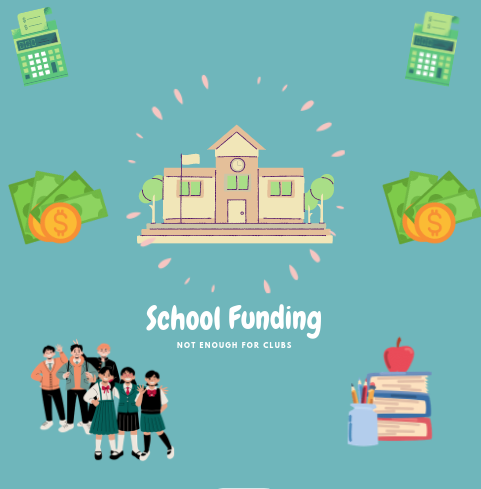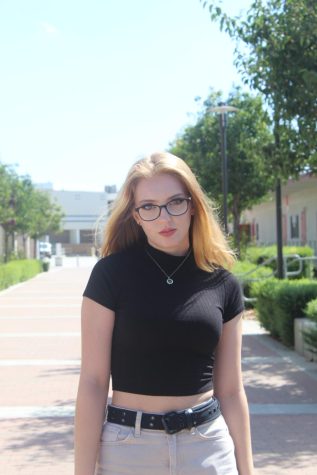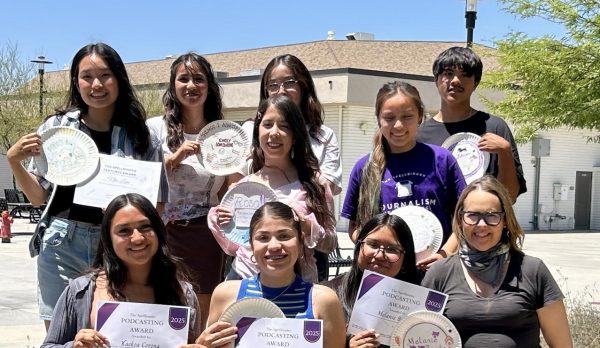Clubs are underfunded: What you need to know

Kimberly Lopez (created with Canva)
The way our school funds activities and clubs is generally unknown by students.
On January 28, my friends and I stayed to watch our school production of “Merry Men.” We sat near the back of the auditorium because we assumed there would be microphones. Little did we know, there were none and all of the actors had to project their voices through the Phillip’s Hall Auditorium. I asked around and found out that the absence of microphones was due to lack of funding.
Lack of funding can be seen throughout most of our extracurriculars. As a school we have made do with what we have but for as much hard work we do, it should pay off. Students at MCHS experience a lot of stress so it makes sense that we should invest in safe spaces, fun activities, and clubs that bring us joy.
Principal Damon Voight said that we receive two main types of funding. He said, “Discretionary is from the district and is based on enrollment. Title I funding is given by the federal government to each state and distributed by need to each school district then to the sites.”
Discretionary funding is used for things that aren’t necessary, but are useful. This type of funding can be used to support students or enrich programs or activities.
On the other hand, Title 1 funding is used for students to meet academic and performance standards. Anything used to help students meet academic standards fits in this category. For example when we used to do SAT prep, any expenses would be paid with Title I funding.
Voight said, “It’s our funding to run the school for the year. We buy most items from this funding as it has a lot less requirements than Title I funding.”
We also receive funding based on enrollment.
Voight said, “We have a much smaller budget than a regular comprehensive high school that may have over 2,000 students compared to our 365. That being said, we get extra funds for necessities such as college textbooks which can cost up to $50,000 a year and for our after-school program.”
Our School Site Council decides how we spend our Title I funds.
“Funds must be spent on items to improve students educationally. The School Site Council is made up of teachers, parents, students, and administrators. Funding between programs and clubs is divided by need and request. The principal controls the discretionary budget and the School Site Council controls the Title I budget,” said Voight.
Now that we know where funding comes from, who gets to decide where it goes, and how it is used, we can discuss the lack of funding in terms of our extracurriculars better. It is important to acknowledge our school has enough money to function but the situation could always be improved.
Kathleen Peterson advises GSA and Ladies First. She said that both of her clubs do not receive any funding from the school, instead the money comes from her own pocket.
Peterson said, “When we did domestic violence week I think I spent $100.”
She mentioned that GSA and Ladies First could do fundraising activities but they would have to create an account with ASB works, which is a complicated process. ASB works is a way for a school to manage fundraising and keep records of it but we do not use it as of now.
If these clubs had more funding, they would participate in more “advocacy work” and make club shirts. Doing so would help raise school spirit and advertise the clubs.
Peterson said, “When we did WASC, school spirit was lacking and club shirts would show our kids are involved. Club shirts would promote ways kids could get involved. They should be able to design it too.”
With these ideas in mind, Peterson said, “It would be nice if each club was given even $50 a year.”
The additional support would give her clubs the ability to have field trips, buy shirts, get outside perspectives, and get a deeper understanding of the topics they teach. Having $50 at the beginning of the school year would give the clubs something to work with, rather than having nothing at all.
Peterson thinks it is important that students realize how much effort teachers put into their classrooms. All of her supplies: the markers, glue sticks, and board games were purchased by her.
She said, “I got grants for the book club books but it’s just understanding how limited the resources really are and how much your teachers do with what they are given.”
Our drama department is another area of concern.
When asked where the funding for drama comes from, Cassandra Silverstein said, “Our shows. Ticket sales. The only funding that we currently possess is the money that we gain by selling tickets. There is no designated theater budget that comes from the school. It’s not like we have $300 a year or anything; it’s purely based on what we earn from selling our tickets.”
For the drama department, it is almost impossible to produce a show without spending any money. This is because using a show without paying royalties is illegal.
Silverstein said it is “beyond difficult to produce without any funding,” but she has done it in the past.
Drama needs funding for props, materials, and royalties but the royalties situation is the most important.
She said, “Not paying royalties is a bad idea. It would mean that the school would owe large fees and it wouldn’t be just us the drama department. We pay for the royalties, the play copies when we produce, whatever props/costumes we can’t find because we mainly borrow from our own wardrobes or from friends and family and occasionally from the SAC theater department.”
Drama maintains its funds through ASB works. They have a treasurer who is responsible for inputting numbers and making purchases. Silverstein pre-purchases things for drama using her personal credit cards and then after the show is over, the treasurer and her will go through it and she gets reimbursed. Silverstein and her treasurer always make sure their sales outweigh their costs by at least $500-$1,000.
Silverstein brought up the fact that arts are generally underfunded. She said, “I have been picking more affordable plays so we can do two a year but in all of this, you have to remember that MCHS is different but it shouldn’t mean that the arts are less important here than they are anywhere else. The people who are in theater are doing so because it is something that is enriching to them and everyone else. We go to the theater to escape and connect. It’s not too much to ask that we fund the arts when it so greatly impacts the social-emotional wellbeing of our students.”
Silverstein said, “It would be nice to better understand the system so we can work it effectively and have a clear cut sense of how we can raise funds. So far, our only source of funding is through productions.”
She doesn’t expect the school to fund everything but said it would be nice to have more clarity on raising funds.
Rafael Ramos said there are restrictions on what foods can be sold. The restrictions in place can be difficult to work around and they make it harder to obtain proper funding.
To clear up some confusion, Ramos said, “ASB does not fund clubs. Clubs have to fundraise to make money that they can then spend. We only fund ASB activities.”
Although ASB has the best understanding of the situation, there are still issues they face in terms of funding too. “ASB is just like any other club. We don’t receive any special funding, or money from the district each year. Every activity we host we pay for through ticket sales or fundraising. We have to be very careful to budget the funds properly so we can afford all of the dances and other events. It can be stressful,” said Ramos.
Voight said that clubs can do their own fundraising if they need to or just ask him.
Voight said, “If clubs have a legitimate need for funding they can ask the principal. Clubs can also raise their own funds through fundraisers approved through ASB. We set aside money to support the clubs. Dance team has requested items and we have purchased them because they were necessary for the clubs.”
Fundraising can be done by clubs but it has to be approved by ASB first.
Voight said, “Clubs can hold fundraisers with approval from ASB. They can also request funds from the principal. We would need rationale for what the money would be spent on first before budgeting.”
When asked to comment on Voight’s statement that clubs can ask him directly for funding, Peterson said, “I am unaware of that policy.”
Our school needs to be more direct with our funding situation because it is our right to know. If we put all of our time and effort into making it a better place for the classes after us, the situation regarding our funding is a very important part of the school for us to understand. Before doing this article I had no idea what our funding looked like and I realized that was an issue. When you don’t know about an issue, you can’t ask for change.

I have 4 cats, I’ve met Kill Bill:The Rapper, and I’ve seen Billy Joel in Vegas




































